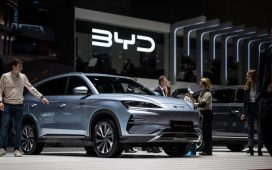What’s the story
Ola Electric, a key player in India’s electric two-wheeler market, is developing solid-state battery technology for its future electric vehicles (EVs).
The company’s Chairman and Managing Director, Bhavish Aggarwal, disclosed this during a conversation with HT Auto.
He outlined Ola Electric’s multi-faceted strategy to achieve comprehensive growth in the Indian EV sector, which includes constructing a Gigafactory near the Future Factory in Tamil Nadu, and innovating new battery technologies.
Are solid-state batteries the future of EVs?
Solid-state battery technology, considered one of the most advanced and efficient cell technologies worldwide, offers more energy density than current electrolyte-based Lithium-ion battery packs.
It is deemed safer with a significantly higher range.
These batteries promise a longer range per charge, reduced vehicle weight, improved thermal efficiency, better safety for EVs, faster charging times, and a longer battery lifespan.
Early-stage experimentation with the tech
While many global automakers are considering solid-state batteries for their future EVs, Ola aims to take the first-mover advantage.
At its Battery Innovation Centre (BIC), Ola Electric showcased its work on this new battery technology.
Aggarwal stated that Ola is in the early stages of experimenting with solid-state batteries and plans to implement this technology in its EVs in the near future, possibly before 2030.
Ola Electric’s transition to in-house battery production
Currently, Ola Electric imports its battery cells from South Korea‘s LG Energy Solution and China’s Contemporary Amperex Technology Co. Ltd (CATL).
However, Aggarwal revealed that the company aims to manufacture its own battery cells for cost-effectiveness.
At the BIC, Ola Electric is working on three different battery technologies. These include 4680 battery cells, sodium-ion batteries, and solid-state batteries.









